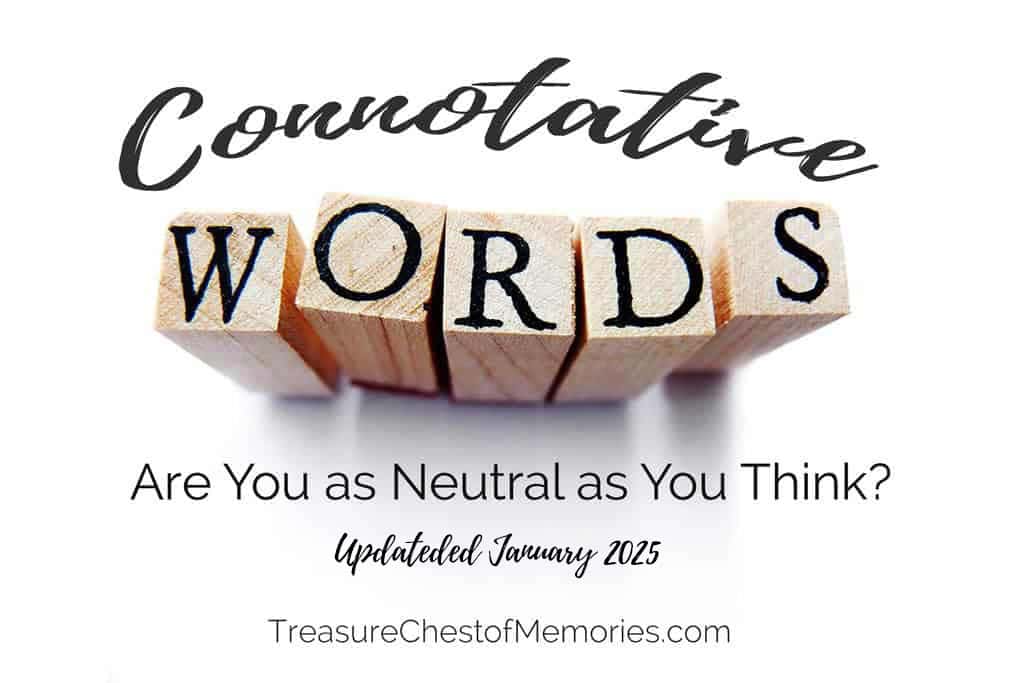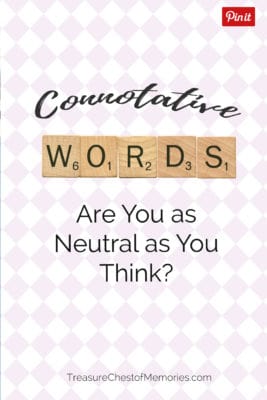
By choosing connotative words, we sometimes communicate things we don’t mean to say.
Are you as neutral as you think? Read on.
Intentional or not, word choices can convey value judgments or carry an emotional connotation. When we call a personal “angry” versus “upset” or “rattled,” readers digest the subtle implications of those words along with the facts of the story.
“Anger,” for example, carries a connotation of righteous indignation, as well as a touch of emotional volatility. “Concerned,” in contrast to “angry,” suggests a just root of the feeling, but implies intellectual and emotional control. “Upset” sounds like an emotional or knee-jerk reaction to a situation, with no implication of righteousness. “Had her panties in a wad,” one of my favorites, suggests a dismissive attitude. The problem was all in the panty-wearer’s head, or worse, a result of a thoughtless undergarment selection.
If you’d like to explore more examples, YourDictionary.com has an article with a quiz.
Why we Should Use Connotative Words
In storytelling, connotative words aren’t all bad. Our feelings, subconscious or conscious, are part of the package. The subtext is often what engages our listeners and our speech patterns and the “tone” of our voice, tells them much about who we are.
Using them can provide readers with insight into thought processes at the time of the event. I may well have felt dismissive about my sister’s concern, and thus, “panties in a wad” would have been my emotional truth.
In your zero or first draft, write without self-editing. Stopping to agonize over the perfect word might cause the narrative flow to stagnate. During the editing process, you can (should) consider if any terms carry a connotation that you didn’t mean to insert. This way, you strike a balance between authentic expression and thoughtful communications.
However, if you’re preserving stories for future generations, you will also want to consider how your words will resonate in the future.
Why We Should Exercise Care when using Connotative Words
When preserving stories and giving future generations a taste of family, a little more intention is called for as we select words.
Part of the point of communicating is making ourselves understood. In a job interview, you don’t just spruce up your resume. You comb your hair, wear nice—at least clean—clothes, and sit up straight. Why? It’s not that you have good posture. Rather, you know that slouching will be misunderstood as disinterest. We want to make sure that the audience doesn’t jump to false conclusions.

Connotative words cast shadow.
This is a touchy point for me because I’ve seen people use vocabulary to re-shape stories, in ways that go beyond simple tact and lean into re-writing the past—using finesse in word choices to warp others’ understanding of the past.
During a recent debate among colleagues, I watched a woman summarize another person’s concerns. While appearing to be neutral, she employed wordsmithing to manipulate others’ feelings about points made. Her use of connotative words effectively muted the voices of those she opposed.
Her opponents weren’t “concerned.” They were “afraid.” Rather than “advocating” for an action, a forty-something woman’s “mother-bear side was showing,” a sly implication of an overreaction rather than rational thought.
A teen’s adamant opinion was “what you might expect of someone of their age, gender, and ethnicity” or, equally dismissive, “reflected their parents’ viewpoint.”
Strategies for maintaining neutrality:
You can still use the words you want—even those with negative connotations—without allowing their subtext to overshadow your story.
-
Add more setting to your story.
Note the differences:
Grandma struck her wooden spoon and snapped at Fred, “…..”
Versus
Some of us didn’t even know Grandma had a ‘last nerve,’ but Fred had found it, gotten on it, rode it hard, and put it up wet. When he …., we got to see the unflappable flap. Grandma struck her wooden spoon on the side of the stove and snapped, “……
The latter gives intentional characterization along with the story. In the former, readers might assume Fred was a victim instead of getting a taste of his own medicine.
As readers get to know both of their personalities, they get a slice of life.
-
Use Your Wordsmithing Powers for Good
Connotative words can be positive, persuasive, and uplifting. Re-read Martin Luther King Jr.’s “I have a dream speech.” His artful use of connotative words such as “momentous,” “hallowed ground,” and “creed” were a part of his ability to inspire.
Take a moment to look at where you’ve used “very” or “good” or “great.” Chances are you can find a more descriptive way to express yourself.
-
Let your Readers get to Know their Narrator.
Fiction writers (and others that write in the third person) are cognizant of the concept of a “trusted narrator.” In a nutshell, readers engage more fully in the story if they trust or understand the viewpoint of the narrator.
The more of yourself you put on each page, the more fully your readers will understand you. When our writing is approachable and transparent, we build trust with our audience. This matters, because if they understand you, they won’t get tripped or wrapped up in a single ambiguous word choice.
TED speaker Sally Kohn recommends using emotional correctness rather that politically correct terms. She points out that if people perceive you as kind and sincere, they are more likely to listen to what you have to say. (Watch the clip.)
-
Explain your word choices
Things that were common terms twenty years ago are now considered offensive. Whether you want to adapt or bow (See, that’s a connotative word) to political correctness, knowing how your word choices will land on readers of different generations and ethnicities will help you write.
Like a lot of good writing, it’s about keeping your readers in mind.
For family historians, historical terms are often problematic. They haven’t just fallen out of use—they’re slurs. When you quote terms found in documents, add notes for readers about why you’re using terminology of the time. When you can, use current terms and avoid terms that are dehumanizing.
Take your readers or listeners back in time with you. For instance, you might explain although “crippled” is considered offensive today, that’s the vernacular of the time and how your grandmother thought of her grandfather and didn’t mean any harm in referring to him that way. In this way, you acknowledge changes in word use over time and help readers understand your character.
Your Turn
When have you grappled with using connotative words? How did you resolve your dilemma? What words do you consider “hot button” terms? How do you write around them?
TreasureChestofMemories.com
© 2013 - 2025 Laura Hedgecock


